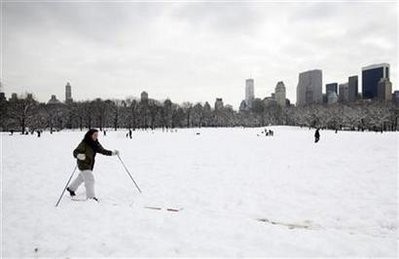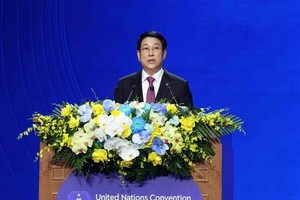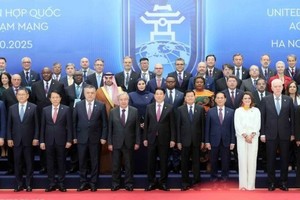The dead of winter – especially this winter with its massive snow storms in the eastern United States – is not the easiest time to make the case for global warming. Short-term weather events and long-range climate change are not the same thing, of course, but it’s hard to separate them in the public’s mind.
But it’s even harder these days to convincingly argue that climate change is a reality.
“Gloomy unemployment numbers, public frustration with Washington, attacks on climate science, and mobilized opposition to national climate legislation represent a ‘perfect storm’ of events that have lowered public concerns about global warming even among the alarmed,” says Anthony Leiserowitz, director of the Yale Project on Climate Change.
Yale and George Mason University recently polled on the question. Since 2008, the number of people who don’t believe global warming is happening has more than doubled to 16 percent. At the same time, those “alarmed” at the prospect of climate change has dropped from 18 percent to just 10 percent, and those who say they’re “concerned” has dropped from 33 percent to 29 percent.

As often happens, shifting attitudes change the political dynamic.
At the environment web site Grist, Amanda Little writes, “Sen. James Inhofe (R) of Oklahoma, one of the world’s most vociferous climate skeptics, is practically giddy these days.”
In the wake of recent scandals and heightened criticism of climate scientists, Inhofe is leading the charge against the Intergovernmental Panel on Climate Change. The IPCC shared the Nobel Peace Prize in 2007 with former Vice President Al Gore.
“There is a crisis of confidence in the IPCC,” Inhofe said in a Senate speech earlier this month. “The challenges to the integrity and credibility of the IPCC merit a closer examination by the US Congress.”
IPCC under the gun“The IPCC clearly has suffered a loss in public confidence,” Stanford University climate scientist Chris Field, who chairs one of the IPCC’s four main research groups, told the Associated Press on Saturday. “And one of the things that I think the world deserves is a clear understanding of what aspects the IPCC does well and what aspects of the IPCC can be improved.”
IPCC chairman Rajendra Pachauri says the UN body will appoint a panel of independent experts to review its reporting procedures.
Meanwhile, action in Congress on climate change has essentially stalled. The cap-and-trade approach approved by the US House of Representatives is likely to be jettisoned, reports the Washington Post, as key senators look for a new way to tackle carbon emissions.
Senators John Kerry, Joseph Lieberman, and Lindsey Graham “plan to introduce legislation next month that would apply different carbon controls to individual sectors of the economy instead of setting a national target,” the Post reports. (Monitor report: The comparative costs of climate change)
As the political debate continues, warnings about global warming keep coming.
NASA: 'Warmest decade on record'NASA reported last month that “January 2000 to December 2009 was the warmest decade on record” and that “2009 was tied for the second warmest year in the modern record.”
Great Britain’s Government Office for Science reports what the Times Online calls an “apocalyptic vision” involving “dramatic changes in lifestyles and landscapes in response to climate change.”
“Business as usual is not an option over the longer term,” said John Beddington, the British government’s chief scientific adviser. “The effects of climate change and new pressures on land could escalate, seriously eroding quality of life.” (Monitor report: Reducing greenhouse gases now may lower climate change risk)
As it has several times in recent years, the Pentagon warns of the security ramifications of a warming globe. “While climate change alone does not cause conflict, it may act as an accelerant of instability or conflict, placing a burden to respond on civilian institutions and militaries around the world,” the Pentagon says in its Quadrennial Defense Review.
Al Gore weighs inFor his part, Al Gore – perhaps the world’s chief Jeremiah on climate change – acknowledges that mistakes have been made by scientists and others.
“The scientific enterprise will never be completely free of mistakes,” Gore wrote in the New York Times Sunday. “What is important is that the overwhelming consensus on global warming remains unchanged.”
And in pointing this out, Gore felt obliged to recognize a very wintery winter:
“The heavy snowfalls this month have been used as fodder for ridicule by those who argue that global warming is a myth, yet scientists have long pointed out that warmer global temperatures have been increasing the rate of evaporation from the oceans, putting significantly more moisture into the atmosphere – thus causing heavier downfalls of both rain and snow in particular regions, including the Northeastern United States. Just as it’s important not to miss the forest for the trees, neither should we miss the climate for the snowstorm.”
























